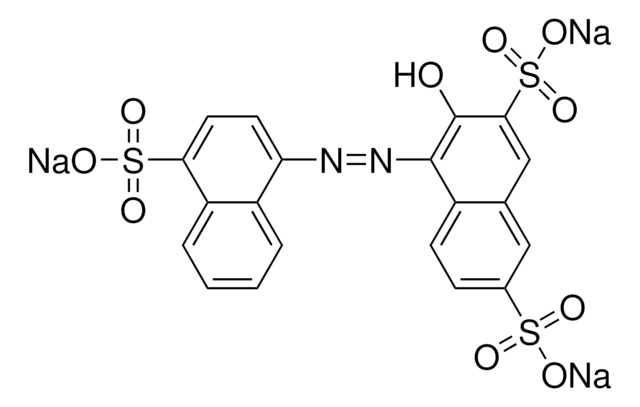About This Item
Recommended Products
grade
analytical standard
Quality Level
vapor density
4.2 (vs air)
vapor pressure
0.15 mmHg ( 20 °C)
50 mmHg ( 120 °C)
product line
PESTANAL®
Assay
≥99.0% (GC)
autoignition temp.
899 °F
shelf life
limited shelf life, expiry date on the label
expl. lim.
40 %
technique(s)
HPLC: suitable
gas chromatography (GC): suitable
refractive index
n20/D 1.551 (lit.)
n20/D 1.552
bp
210-211 °C (lit.)
mp
5-6 °C (lit.)
density
1.196 g/mL at 25 °C (lit.)
application(s)
cleaning products
cosmetics
environmental
flavors and fragrances
food and beverages
personal care
format
neat
SMILES string
[O-][N+](=O)c1ccccc1
InChI
1S/C6H5NO2/c8-7(9)6-4-2-1-3-5-6/h1-5H
InChI key
LQNUZADURLCDLV-UHFFFAOYSA-N
Looking for similar products? Visit Product Comparison Guide
General description
Application
Legal Information
Signal Word
Danger
Hazard Statements
Precautionary Statements
Hazard Classifications
Acute Tox. 3 Dermal - Acute Tox. 3 Inhalation - Acute Tox. 3 Oral - Aquatic Chronic 3 - Carc. 2 - Repr. 1B - STOT RE 1 Inhalation
Target Organs
Blood
Storage Class Code
6.1A - Combustible acute toxic Cat. 1 and 2 / very toxic hazardous materials
WGK
WGK 3
Flash Point(F)
190.4 °F - closed cup
Flash Point(C)
88 °C - closed cup
Personal Protective Equipment
Choose from one of the most recent versions:
Already Own This Product?
Find documentation for the products that you have recently purchased in the Document Library.
Our team of scientists has experience in all areas of research including Life Science, Material Science, Chemical Synthesis, Chromatography, Analytical and many others.
Contact Technical Service








